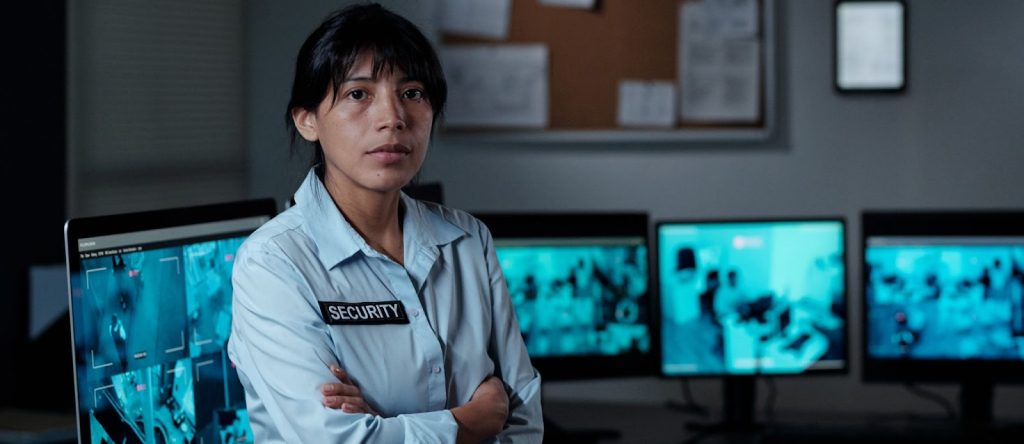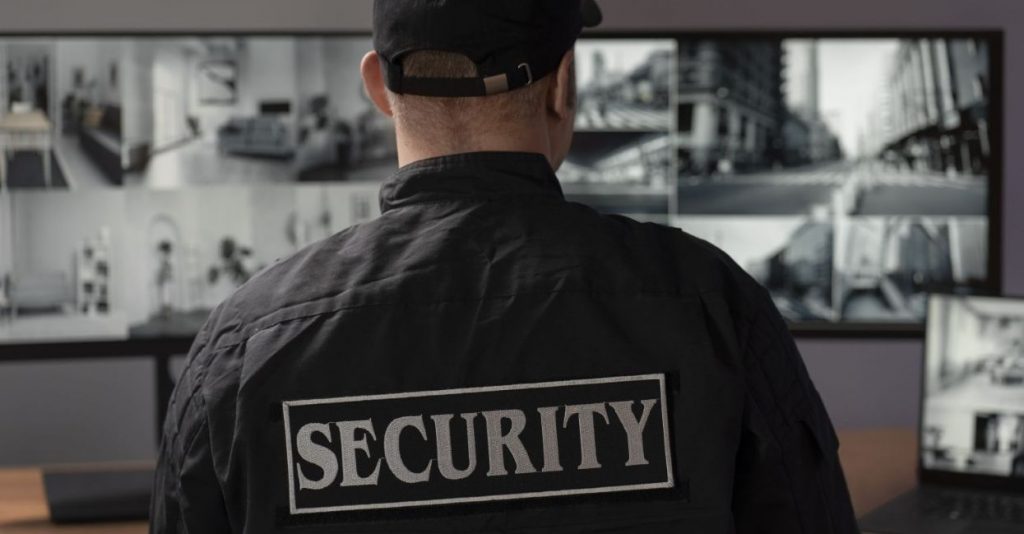Technology, and specifically security technology, is advancing at an alarming rate, especially since the arrival of advanced AI systems. The good news is that most pundits believe there will always be a need for human interaction—or, at the very least, that the sort of sci-fi-level robotic devices required to, say, replace your average door supervisor in a busy club on a Saturday night are decades away and unlikely to be a cost-effective solution even then.
What we are seeing, however, is an increase in security technology to assist, rather than replace, security officers. Much of this is designed to save time and money, but a great deal of the innovations we are seeing can provide a safer environment than ever before. Let’s have a look at some of this security technology.
CCTV, But Not As We Know It

CCTV or Closed Circuit Television has been around for almost as long as TV itself. For decades, however, we put up with grainy pictures, awful recording systems and abysmal night-time or low-light performance. Things have improved dramatically over the last 30 years. We now have 4k cameras with fantastic IR low light image quality, PTZ (pan, tilt, zoom) cameras with amazing zoom levels, hard drive recording systems with a small box that replaces what would have been, 25 years ago, a VHS video recording system that needed 2 tapes per day, and a bookcase full, to store a month’s worth of recordings.
The big advance, however, is in facial recognition. Although accuracy is still not 100%, the ability to take a photo of a shoplifter and upload it to your CCTV system with an alert notification attached is helping security officers stop trouble at the door. This security technology is also being used for identifying troublemakers, wanted criminal suspects, and even helping to find missing persons.
A bit too much like “Big Brother”? Maybe. That debate continues, but the security technology is with us now. Worth reminding companies that if the CCTV system covers public spaces, or areas open to the public, then the CCTV operator, or person/s reviewing any recorded CCTV footage, will require a Security Industry Authority CCTV licence.
Recommended Reading: Effortless Compliance with GuardPass’s Licence Hub
Body Cams or Body Worn Video (BWV)
Due in no small part to the huge increase in violence faced by security workers on duty, and the need to provide evidence to defend or justify their actions, or prosecute offenders, BWV is becoming an increasingly common sight attached to the chests of door supervisors, event security, and response officers.
A recent survey indicated that BWV was the most effective form of deterrent against violence if the offender was made aware that their actions were being recorded. Most BWV units also have emergency alert buttons, programmed to alert a control room in the event of a wearer being assaulted and requiring assistance.
Again, this security technology can not be deployed without thought and planning, as systems have to be in place for the secure GDPR compliant storage of all recorded footage, and the review of that footage will, in most cases, need to be performed by an SIA public space surveillance licence holder. Speak to an expert before paying for a system and cameras.
Shift Management Systems
I am so old that I can remember booking on duty with a designated on-site telephone, using a big clockwork box with keys located in different places on site, to record my patrols, and anything noteworthy had to be reported via radio to base, or called in to a central control room later. Hourly check calls had to be phoned in to a control room, and we would receive random visits from a mobile supervisor at night to make sure we weren’t asleep, or wearing pyjamas, I kid you not. I’ve found security officers doing just that.
These days, the technology in your average mobile phone can do pretty much everything I mention above and more, and has made lone working safer than ever before. Logging in to your phone’s shift management system when you arrive at work will log you on duty, and GPS technology can prove exactly where you were when you logged on. Some systems require you to take a selfie to prove you are in full uniform.
Patrols can be logged automatically, and GPS confirms that you performed the patrol correctly without the need for checkpoints anywhere on site. If an officer leaves the site, GPS geofencing will alert the control room who will contact the officer to see what is going on. Reports can be submitted via the app, and photos included. Check calls can be made by just pressing a button.
Best of all, however, is the ability to covertly summon help if you’re under duress, or even activate an emergency “man down” procedure if the phone has been monitored to be in a prone position for a length of time, or if a check call or patrol is missed.
Behind the scenes, this software can be integrated with payroll to ensure the accuracy of salary payments, and can be used to raise a query if required. Data regarding patrols, shift booking on and off times, and incidents can also be analysed by management to prove SLAs are being met and accurately generate figures for KPIs with a few keystrokes.
Personal Protective Equipment (PPE)
As mentioned earlier, violence against security workers is at scandalous levels, as is the disturbing rise in knife crime.
Many companies are now choosing to equip their officers with stab or slash-proof clothing. This can range from gloves or a protective sleeve for the forearm to full hard body armour in some high-risk deployments. These things are nowhere near as big and bulky as they used to be, and can be worn under a work shirt easily.
Knife and Firearm Detection
It is a sad indictment on our society that “walk-through metal detectors” or “knife arches” are now commonplace at the entrances to many sites and events. Over the years, however, we have become far more used to door supervisors or security at transport hubs using metal detecting “wands” to look for potentially dangerous articles when entering their premises.
Technology has moved on here, too, however. There is now equipment that can identify concealed weapons by the way clothing sits, or by the metal composition, giving an instant and reliable alert if a firearm or knife is detected.
No “Terminator” Just Yet
Several companies are producing robotic security patrol devices in a variety of forms. One of my favourite posts on social media was of a shopping centre patrol robot that somewhat resembled a litter bin with lights on, lying in an ornamental fish pond. The tag line “unable to cope with its mundane existence, the security robot took its own life” did cause a chuckle.
There are many more serious bits of kit out there, however. The US military uses robotic dogs armed with high-visibility cameras and communications hardware to patrol base perimeters and instantly alert a control room if an issue is found. After recent issues with a Palestinian terrorist group getting into an RAF base and causing damage to aircraft, maybe the Ministry of Defence should be looking at similar kit? #JustSaying.

What The Future Holds
Advances in facial recognition applications are moving rapidly. Combining this with mobile technology presents interesting possibilities.
Violence is also a growing concern, and new safety tech will certainly be incorporated into more regular clothing for security officers. Voice recognition and more intuitive AI will also mean that reports can be dictated and corrected without the need for a traditional keyboard, further adding to reliance on mobile technology. Robot security officers? Until they can identify a criminal or potential hostile reconnaissance suspect, help a member of the public with directions, smile while dealing with idiots, run at 20 mph to detain a villain, and take a punch in the face without needing a trip back to the factory to fix, humans will always be better.
Take the Next Step With GuardPass
Security technology is transforming the tools of the trade, but skilled, licensed professionals remain essential. GuardPass helps you hire fast, stay compliant, and deploy security staff ready to work with today’s tech.
Hire pre-vetted security professionals and stay ahead in a tech-powered security world.
